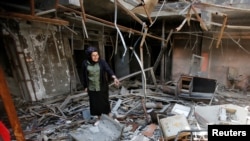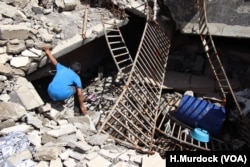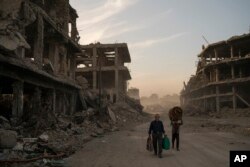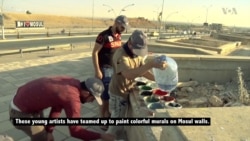One year has passed since the U.S.-backed Iraqi army and its allied Shi'ite militias defeated the Islamic State (IS) terror group in Mosul. Yet much of the city is still a pile of rubble, with residents losing hope that they will be able to return to a normal life anytime soon.
Mosul is Iraq's second-largest city, with a population of more than 1 million people and the biggest formerly IS-controlled city across Iraq and Syria.
Iraqi Prime Minister Haider al-Abadi officially declared victory over IS in Mosul July 10, 2017. The jihadist group has since lost control of all territories it once controlled in Iraq and struggles to hold the remaining small pockets of territory it has in eastern Syria.
The initial video of destruction in the aftermath of the Mosul operation drew international attention, with the United Nations secretary-general's special representative for Iraq, Jan Kubis, warning the Security Council that the road ahead was "extremely challenging."
The U.N. estimated that more than $700 million was needed to stabilize the city and make it livable.
Struggle
Mosul residents who spoke to VOA explained the daily struggles people in the city face 12 months after IS's expulsion. Many are still living in refugee camps and waiting for help to rebuild their destroyed homes.
Jafaar Subhi, 47, along with his wife and eight children, are among the few residents of the Old City neighborhood who have returned from displacement. Their shell-pocked home is hardly habitable, but they say they do not have other options.
"Our house was hit by an airstrike and several rockets because IS fighters were hiding on its roof," Subhi told VOA. "We are going through all of this because of IS terrorism. We alone live in this area. None of our neighbors have returned."
Subhi said many Old City residents who returned home after Mosul's recapture have left the neighborhood again due to a lack of support and public services.
The historical Old City used to be a densely populated district and Mosul's trade center before IS occupation in mid-2014. The area is now a husk of shattered concrete and twisted metal that once were part of people's homes and shops.
"There is no water or electricity in the neighborhood. With the exception of some visits by charity organizations, no one asks about us here," Subhi added.
An assessment by the Norwegian Refugee Council this month revealed that around 54,000 houses in Mosul and surrounding areas are still destroyed, and 383,934 people remain displaced. It estimates $874 million are needed to repair basic infrastructure in the city.
"What was hailed by the Iraqi authorities and the international community as a victory a year ago has not translated to relief from abject misery for many Iraqis from Mosul," said the refugee agency's Iraq director Wolfgang Gressmann. "One year on, they are still waiting to return to normality, and the international community is not helping enough."
Reconstruction
The Iraqi government has said it is doing its best to reconstruct Mosul and other areas recaptured from IS.
City officials Tuesday announced they are working with the U.N.'s Development Program (UNDP) to start rehabilitating 10,000 homes in the Old City. The U.N. agency has also provided water treatment plants in several Mosul neighborhoods to give access to clean water to thousands of people.
Younis Sharif, head of Nineveh University reconstruction projects and a member of the reconstruction committee of Mosul, told the local Shafaaq News that the reconstruction project excludes entirely destroyed houses.
No longer willing to wait for help, many residents have started borrowing money to rebuild their homes. For them, reconstruction can start from something as simple as removing debris or repainting walls disfigured by bullets or covered with violent IS graffiti.
WATCH: Mosul Artists Help Restore Shattered City
Residents say full recovery will also require reimbursing those who suffered damage in the conflict and providing job opportunities to those who lost their businesses.
Disabled victims
Demand for compensation is particularly high among residents who were disabled by the war.
Besides the large number of civilian war deaths, estimated to be 11,000 by an Associated Press investigation, the number of those who were disabled is also staggering.
Saeed Nizar, head of a Mosul-based charity group, told VOA that over 2,500 residents handicapped by the war with IS have registered with his organization for a stipend. He said many have been forced into begging due to a lack of support.
"The government hasn't provided any accommodation for people with disabilities. They have no pension or other sources of income," Nizar said.
Iraqi officials said they need generous international aid to allow them to restore the damage.
An international conference in Kuwait earlier this year collected about $30 billion, mostly in credit and investments, to help rebuild Iraq's economy and infrastructure. However, that amount fell far short of Iraq's hope for $90 billion for post-IS recovery.
VOA's Kawa Omar contributed to this report from Mosul.








